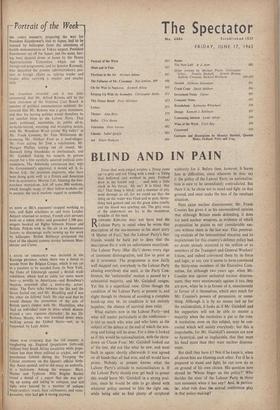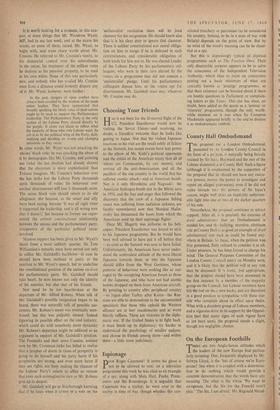BLIND AND IN PAIN
From that wide-ringed trouble a Thing came up—a grey and red Thing with a neck—a Thing that bellowed and writhed in pain. Frithiof
drew in his breath and . . said with a little cluck in his throat, 'Ah me! It is blind. Hur ilia! That thing is blind,' and a murmur of pity went through us all, for we could see that the thing on the water was blind and in pain. Some- thing had gashed and cut the great sides cruelly and the blood was spurting out. The grey ooze of the undermost sea lay in the monstrous wrinkles of the back .
RUDYARD KIPLING may not have had the Labour Party in mind when he wrote that description of the sea-monster in his short story 'A Matter of Fact,' but the Labour Party's best friends would be hard put to deny that the description fits it with an unfortunate exactitude. The Labour Party (Hur illa!) shows every sign of imminent disintegration, and few so poor as do it reverence. The programme is now fairly well Mapped out; everybody in the Labour Party abusing everybody else until, at the Party Con- ference, the 'unilateralist' motion is passed by a substantial majority, and Mr. Gaitskell resigns. Yet this is a superficial view. Grim though the condition of the Labour Party at present is, and slight though its chances of avoiding a complete break-up may be, its condition is not entirely hopeless; the chance of survival does exist.
What matters now in the Labour Party—and what will matter particularly at the conference— is not so much who wins and who loses, as the subject of the debate at the end of which the win- ning and losing will be done. For a time it looked as if this would be nationalisation, with the show- down on Clause Four. Mr. Gaitskell looked out of his tent, did not like what he saw, and went back in again; shortly afterwards it was agreed on all hands that all had won, and all would have prizes.• Nobody at present knows what the Labour Party's attitude to nationalisation is. If the Labour Party should ever get back to power this would leave Mr. Gaitskell in a strong posi- tion, since he would be able to go ahead with whatever policy seemed to him the right one, while being able to find plenty of scriptural authority for it. Before then, however, it leaves him in difficulties, since whatever he may say is the policy of the Labour Party on nationalisa- tion is sure to be immediately contradicted. But there it is; he chose not to stand and fight on that ground, and must make the best of the resultant situation.
Next came nuclear disarmament. Mr. Frank Cousins has given it as his unconsidered opinion that although Britain needs defending, it does not need nuclear weapons, as evidence of which proposition he points to our considerable suc- cess without them in the last war. This penetrat- ing analysis of the international situation and its implications for this country's defence policy had no doubt already occurred to the million or so members of the Transport and General Workers' Union, and indeed convinced them by its force and logic; at any rate it seems to have convinced the thirty-nine members of the Executive Com- mittee, for although two years ago, when Mr. Cousins was against unilateral nuclear disarma- ment, they were unanimously against it too, they are pow, when he is in favour of it, unanimously in favour of it themselves, which says much for Mr. Cousins's powers of persuasion, or some- thing. Although it is by no means tied up for the unilateralists, it looks as if Mr. Gaitskell and his supporters will not be able to muster a majority when the resolution is put to the vote. A resolution, even on this subject, may be con- cocted which will satisfy everybody; but this is improbable, for Mr. Gaitskell's enemies are now so hysterical, and so implacable, that they want his head more than they want nuclear disarma- ment, But shall they have it? Not if he keeps it, when all about him are blaming each other. For if he is prepared to stand and fight, Ile can now do so on ground of his own choice. His question now should be 'Whose finger on the policy?' Who decides the aims of the Labour Party in those rare moments when it has any? And, in particu- lar, what role does the annual conference play in that policy-making? It is worth looking for a moment, in this con- text, at some things that Mr. Woodrow Wyatt, MP, had to say last week, and at the storm his words, or some of them, raised. Mr. Wyatt, to begin with, said some sharp words about Mr. Cousins. He referred to Mr. Cousins's vanity, to his dictatorial control over his subordinates in the union, his treatment of the million votes he deploys as his personal property, to be used at his own whim. None of this was particularly new, and nobody who has studied Mr. Cousins even from a distance could honestly dispute any of it. Mr. Wyatt, however, went farther : In the past, dangers of open conflict have always been avoided by the wisdom of the trade union leaders. They have appreciated that broadly speaking the block votes of their unions ought to be used to support the Parliamentary leadership. The Parliamentary Party is the only section of the Labour Party elected directly by the people. It alone can 'claim to reflect what the majority of those who vote Labour want. Its job is to be the political wing of the Party, daily studying and deciding on events and changing situations as they occur.
In other words, Mr. Wyatt was not attacking the unions' block vote; he was attacking the abuse of it by demagogues like Mr. Cousins, and pointing out (what the last election had already shown) that the electorate is more sophisticated than Tribune imagines. Mr. Cousins's behaviour over the bus strike lost the Labour Party thousands upon thousands of votes; his behaviour over nuclear disarmament will lose it thousands more. The union block vote should return to its old allegiance; nbt because, as the smart and silly have been saying, because 'It was all right when it supported the leadership, and is all wrong now that it doesn't,' but because its former use repre- sented the correct constitutional relationship between the unions and the parliamentary party, irrespective of the particular political issues involved.
Massive support has been given to Mr. Wyatt's thesis from a most unlikely quarter. Sir torn Williamon's remarks must have served not only to stiffen Mr. Gaitskell's backbone—in case he should have been inclined to panic at the reaction to Mr. Wyatt's speech, but to underline the constitutional position of the unions vis-a-vis the parliamentary party. Mr. Gaitskell should take heart; he now knows not only the identity of his enemies, but also that of his friends.
Nor need he be too heartbroken at the departure of Mr. Alfred Robens. When talk of Mr. Gaitskell's possible resignation began to be, heard, there was naturally talk of possible suc- cessors. Mr. Robens's name was eventually men- tioned; but this was palpably absurd. Indeed (ignoring its possible effect on the coal industry, which could do with somebody more dynamic) Mr. Robens's departure might be adduced as an argument in support of Mr. Gaitskell's position. The Footmiks and their town Cousins, assisted now by Mr. Crossman (who has failed to realise that a prophet of doom in times of prosperity is going to do himself rand his party harm if his prophecies are wrong, and even more harm if they are right), are busy making the chances of the Labour Party's return to office so remote that even such unimaginative men as Mr. Robens give up in despair.
Mr. Gaitskell will go to Scarborough knowing that if he loses when it comes to a vote on the
'unilateralist' resolution there will be loud clamour for his resignation. He should know also that it is his clear duty to ignore that clamour. There is neither constitutional nor moral obliga- tion on him to resign if he is defeated in such circumstances, and considerable obligation of both kinds for him not to. He was elected Leader of the Labour Party by his parliamentary col- leagues, who were in their turn elected by the voters on a programme that did not contain a 'unilateralist' pledge. Until his parliamentary colleagues depose him, or the voters opt for disarmament, Mr. Gaitskell must stay, whatever Mr. Cousins may do.











































 Previous page
Previous page